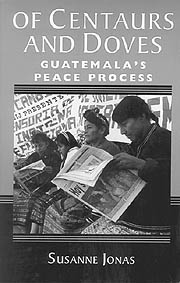
February 28, 2000
Guatemala's peace requires international support, says author
In a world plagued by civil wars, many of them involving ethnic clashes, the peace
process that ended Guatemala's bloody 36-year civil war stands as evidence that seemingly
intractable conflicts can be resolved at the negotiating table. Three years after
the signing of peace accords between leftist insurgents and a U.S.-supported government,
the new book, Of Centaurs and Doves: Guatemala's Peace Process by Susanne
Jonas, details the long and bumpy road to Guatemala's historic peace and provides
up-to-the-minute analysis of the first three years of implementation of the United
Nations-mediated agreements.
 |
With a new government having just taken office this January, the coming year will be crucial to the realization of all that the peace accords promise, she said. But the burden of proof lies with the new government, whose political party had opposed the peace negotiations. According to Jonas there is a small window of opportunity now. "The government will be under pressure from pro-peace forces in Guatemalan civil society and from the newly legalized political Left," she said. "But by themselves, these internal forces are not strong enough to guarantee governmental compliance."
Hence, pressure from the international community--including the U.S. government--will be key, said Jonas, whose previous books include The Battle for Guatemala and Immigration: A Civil Rights Issue for the Americas. "The international organizations and governments that supported Guatemala's peace negotiations will have to remain vigilant to assure an enduring peace," she said. "The stakes are very high: If this attempt to bring change to Guatemala fails, the country may not have another chance for decades."
Jonas's new book is the first English-language book-length account of Guatemala's difficult peace negotiation and postwar progress. The Guatemalan peace process is a source of lessons for the Americas and beyond, and Jonas's analysis addresses broader issues about revolution, negotiation, peacemaking, democratization, and the role of U.S. interests overseas.
Guatemala has captured the hearts and minds of people around the world in part because of the jarring juxtaposition of the country's natural beauty and diverse indigenous cultures with the extreme brutality of its counterinsurgency army, which has tainted Guatemalan politics ever since the 1954 U.S. covert intervention in the country. International efforts to publicize the army's genocidal actions during the early 1980s helped mobilize grassroots support from religious groups, human rights organizations, and indigenous rights networks, but few believed the war could end through political negotiations. What made the difference was a combination of factors--both domestic and international--that compelled the army to begin negotiating despite its military strength, asserts Jonas.
"The brutality of the war, in which more than 200,000 civilians were killed or 'disappeared,' and the seeming invincibility of the army, made the negotiated end of the conflict all the more remarkable," said Jonas. "The army had to negotiate in large measure because of its record as Latin America's most brutal counterinsurgency apparatus." A major lesson emerging from Guatemala and El Salvador was the ending of these Cold War civil wars through negotiations, rather than winners imposing the terms of peace on losers, she said.
The wide-ranging peace accords are ambitious, containing hundreds of commitments. Jonas's book chronicles the step-by-step process of peace talks that began in 1991 and examines the contents of the accords, which were signed in December 1996. Two of the most important accords regard the rights and identities of Guatemala's indigenous peoples, who make up 60 percent of the population, and demilitarization, which Jonas said is the key to democratizing Guatemala. "The indigenous accord goes far beyond anti-discrimination provisions to establish political and cultural rights and redefine Guatemala as a multiethnic, multicultural, and multilingual nation," she noted.
The second half of the book chronicles the battles to implement the accords. Both the indigenous and demilitarization accords suffered a tremendous setback with the defeat last May of a ballot referendum that would have reformed the Constitution. Jonas attributes that outcome largely to a last-minute, well-financed "no" campaign launched by opponents that relied heavily on racist, anti-indigenous arguments. The stunning defeat sent an unmistakable "wake-up call" to advocates and supporters of the peace accords, but Jonas predicts that internal pro-peace forces will succeed only if they are strengthened by support from the international community.